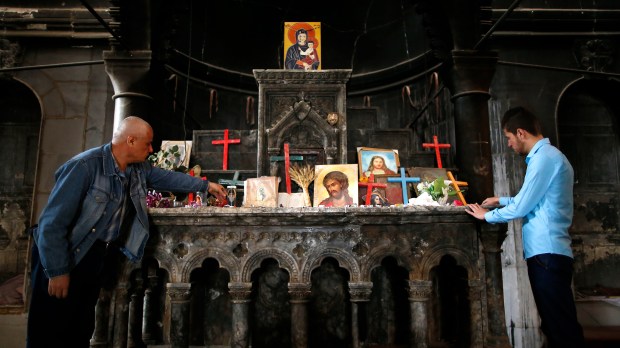Lenten Campaign 2025
This content is free of charge, as are all our articles.
Support us with a donation that is tax-deductible and enable us to continue to reach millions of readers.
In Baghdad, Catholics pray in the Sayidatal-Najat cathedral.This is the cathedral that was the target of the terrible attack in October 2010. More than 58 Christians perished, including two young priests who were celebrating Mass.This massacre, claimed by the nascent Islamic State, has traumatized all Christians in Iraq.In 2012, the government funded all of the renovations – for a total of $ 10 million.A significant act that shows support for the persecuted Christian community.
The church is now brand new but the memory of the victims remains omnipresent and painful.Large banners of the martyrs hang in the cathedral.A museum was even inaugurated in the crypt in memory of the Christians who were executed, their only crime having been to attend Mass.
The Syriac archbishop, YoussifAbba, confided to us: “Today the cathedral is protected by armored walls, by soldiers, to avoid any deadly intrusion.The parishioners are still in shock but they remain faithful.”
The archbishop only travels by car now.He has to live in a supervised enclave, away from the population.However, this does not prevent him from regularly visiting his parishioners, particularly the community ofdisplaced Christians.
The church is the epicenter
In recent years, a Christian refugee camp was set up a few kilometers from the cathedral. Some 90 families from the Nineveh plains are housed there. On a vacant lot, a row of bungalows, generators to guarantee at least minimal electricity, a secluded life.
These Christians, traumatized byISIS, hesitate to return home.First of all, they are afraid of not finding work and finding their homes destroyed or burned down.It is not easy to leave life in Baghdad, precarious as it is, to start all over again, rebuilding everything.
To help counter idleness andmelancholy,the local Church, under the impetus of the bishop, organizes various parochial activities in the camp.
The beating heart of this makeshift village remains the church.It is not only used to celebrate Mass.Weddings are prepared there, lessons are taught, and the offices of the camp officials are nearby.The church is the epicenter of social life.
Saïd, a Christian and a father of 58, feels reassured there.“The Abouna (the Father in Arabic) says daily Mass. The women attend Mass while the men mull over their hypothetical return home.”
Bishop Abba dons the clothes of a pastor but also of a father.His presence appeases.He is like a tribal leader who has the difficult responsibility of maintaining hope.
Christ, the last consoler
Further north, in the city ofKirkuk,the situation is different.The Sacred Heart Cathedral brings together all the Chaldean Christians of the district. Sunday Mass is presided over by BishopYousifThomasMirkis, the local bishop.
During his homily, the bishop gives hope as Christmas approaches.Jesus is “the way, the truth, the life.” The large congregation singsliturgical songs in Arabic with great fervor, prays with rare intensity.From the smallest child to Malika, a grandmother of ninegrandchildren, everyone sings Alleluia as if with one voice.Faces are serious;Christ seems to be the only and last consoler.
During this time of Advent, faith in a renewal, in a more peaceful future, makes perfect sense.We see on the faces of these Christian survivorsthe same harmony, the same yearning for God.The pastoral ministry is starting up again.And so are pilgrimages to the mythical tomb of Mar Behnam which, thanks to Christian workers and the Fraternity in Iraq, is rising from its ashes …
~
This article is translated and adapted from Aleteia’s French edition.

